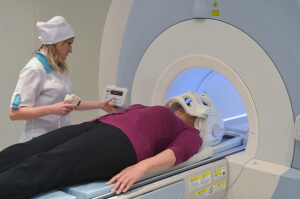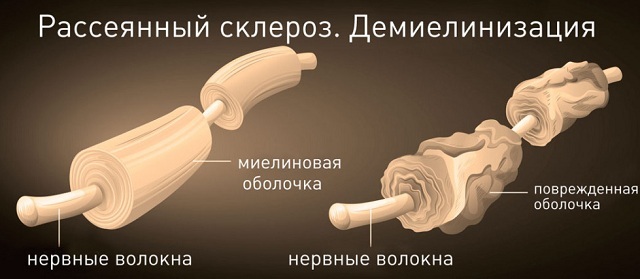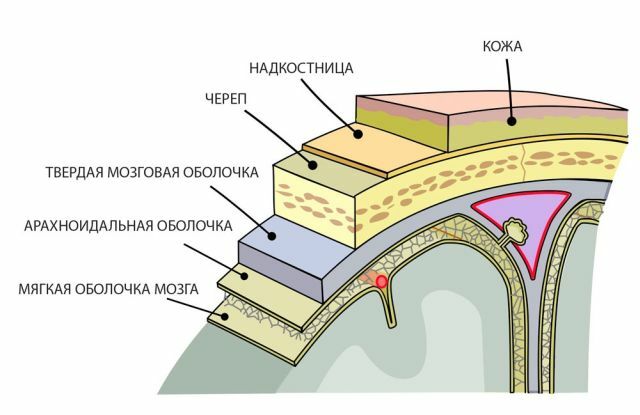 Even with a high level of medical development, mankind suffers from a variety of diseases that are still incurable and lead to the death of the patient. One of these ailments is dementia.
Even with a high level of medical development, mankind suffers from a variety of diseases that are still incurable and lead to the death of the patient. One of these ailments is dementia.
Worldwide, the incidence of it is approximately 35.6 million people, and the forecasts are disappointing - it is expected that in 15 years the number of patients will double. Most cases are registered in Western countries.
But it is possible that the reason for this lies in the usual ignorance of the domestic population about this disease.
Content
- What is this
- disease cause of dementia
- diseases causing dementia
- Classification
- degree
- gravity Localization
- According
- types How does the disease
- Signs of caused by factors disease
- Diagnostics
- Methods of treatment
- Preventive measures
- Video: Vascular dementia -how to preserve memory and mind
What is this disease
Dementia is an disease related to the loss of the ability to cognize
, remembering informationrational thinking, logic, there can also be a change in personality. In the people this phenomenon is called dementia.Causes of Dementia
The most common dementia is experienced in the elderly, from 60 years of age or older.
But also cases where young people fall ill are not uncommon.
Causes of dementia : traumatic brain injury, toxins that lead to the destruction of brain cells, drug addiction, drug and internet addiction, fanaticism, shopaholism, gambling, unhealthy addiction to food.
Diseases that cause dementia
With respect to diseases leading to dementia, the includes:
- Alzheimer's disease;
- vascular dementia;
- micro strokes;
- tumors and abscesses of the brain;
- alcoholism;
- Parkinson's disease;
- traumatic brain injury;
- Pick's disease;
- Huntington Horea;
- spinocerebellar degeneration;
- Gellervorden-Spatz disease;
- hashish psychosis;
- AIDS;
- neurosyphilis;
- viral encephalitis;
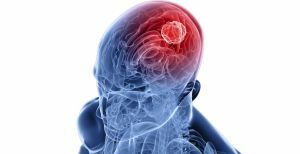
- Creutzfeldt-Jakob disease;
- bacterial and fungal meningitis;
- deficiency of folic acid, vitamin B3, B12;
- thyroid disorders;
- systemic lupus erythematosus;
- multiple sclerosis and other diseases.
Classification of
Dementia is classified according to several criteria.
Degree of severity
By severity, dementia is:
- Easy. The ability to self-reliance, criticism, hygiene compliance is preserved, although social activities have been significantly damaged. The patient feels lethargy, quickly gets tired of mental stress, can not concentrate, loses motivation and interest in everything that surrounds him. Quickly forget current events, often changing the mood.
- Moderate. Symptoms of the disease become more obvious, memory and ability to navigate in a well-known locality are greatly disturbed, and the ability to use household appliances is lost. The personality of the patient changes, aggression and irritability appear, and in some cases - on the contrary, apathy. Neglected questions about their own nutrition and hygiene, there is an unreasonable concern. The patient ceases to recognize familiar faces. Leaving a person alone in this state is not possible, because he can do himself harm.
- Heavy. There is a degradation of the person, the patient ceases to understand what he is told, perceives his family absolutely foreign people, can not eat and even swallow. There is involuntary urination and defecation, the patient spends most of the time in bed and needs care.
Localization of
Localization of lesions of the brain :
- Cortical dementia - affects the cortex of the brain. The causes of the disease are Alzheimer's disease, alcoholism.
- Subcortical - subcortical structures are affected.
- Cortical and subcortical .
- Multifocal - when many lesions are formed.
By type
By the way the disease happens:
- Lacunar dementia of - is characterized by loss of memory, mood change, sentimentality and increased tearfulness.
- Dementia of the Alzheimer's type - spatial orientation is disturbed, delusions occur, neuropsychological disorders, depression due to its insolvency.
- Total dementia of - abstract thinking, attention, perception and memory are strongly violated. Disappears shyness, politeness, a sense of duty, the personality of the patient is destroyed.
- Mixed dementia - combines the symptoms of primary degenerative disorders that accompany Alzheimer's disease, and vascular dementia.
As the disease of
 is manifest. In fact, the symptoms of dementia at the first stage are very difficult to notice, because its signs are not very pronounced.
is manifest. In fact, the symptoms of dementia at the first stage are very difficult to notice, because its signs are not very pronounced.
Therefore, few people seek medical help at the beginning of the disease, the symptoms of dementia are exacerbated, the patient's condition worsens.
Because of this, the disease progresses further, not restrained.
The main symptoms of include:
- memory impairment, both short-term and long-term, a return to the level of development of early childhood;
- disappears ability to criticality, abstract thinking, there is a violation of speech, movement and perception;
- there is a sudden loss of dressing skills, personal hygiene;
- there is a social disadaptation in the family and at work;
- lost the ability to orient in space.
Symptoms of disease-causing factors
Depending on what became the cause of dementia, the symptomatology of it is different.
So, senile dementia, caused by Alzheimer's disease, is almost invisible at first and the symptoms are blurred. If a person works, then the manifestation of the disease can be a loss of professional skills.
There is forgetfulness, depression, fears, sudden anxiety, apathy may occur.
The patient's speech can be simplified, or the words in the sentences will be incorrectly selected. If a person drives a car, he will have problems with recognizing traffic signs.
Over time, he becomes incapable of communicating with others.
If the cause of dementia is repeated micro strokes , then the disease develops "stepwise", the patient's condition then improves, then again falls into decay.
By keeping blood pressure under control, it is sometimes possible to prevent a second stroke, which significantly improves the condition.
Dementia, caused by AIDS , initially proceeds imperceptibly, but gradually progresses.
Vascular dementia has such symptoms: epileptic seizures, walking disorders, which become slow, shuffling, the patient is unstable on his legs, which often leads to his fall.
Another characteristic symptom of vascular dementia is uncontrolled urination. Often there is a retreat of the disease, but this is temporary.
It also happens that the patient's condition is restored, but not to the level that preceded the stroke.
Basically, however, senile( senile) dementia of progresses and its symptoms become more pronounced. There is apathy, a depressive state, difficulties with the solution of ordinary questions.
The patient becomes completely helpless, can not take shower on his own, dress, prepare food.
Aging dementia developing due to Peak disease has its own specific signs and symptoms - manifested by passivity of behavior, disappearance of 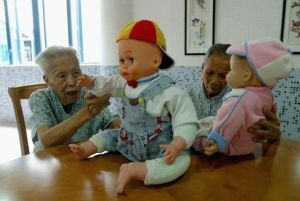 ability to criticality, impulsiveness.
ability to criticality, impulsiveness.
In behavior, roughness, hypersexuality, profanity begins to appear, disorder of will and drives is observed.
At the same time, basic skills, such as the ability to count, write, the usual actions in the work, persist for a long time. Also the patient can use his memory longer.
Diagnosis
In order to diagnose dementia, the physician conducts a survey of the patient and his relatives , asking simple questions and trying to find out the state of the patient's intelligence.
Relatives, in turn, can tell about the symptoms of dementia seen by them.
also carries out a biochemical blood test for , it turns out that the medication taken by a patient can not cause dementia. To exclude a brain tumor, stroke or hydrocephalus, a computer or magnetic resonance imaging is prescribed.
If a doctor suspects that senile dementia is the result of of Alzheimer's and all the symptoms indicate this, he will prescribe a brain biopsy , which will detect the destruction of nerve cells, spinal fluid and positron emission tomography.
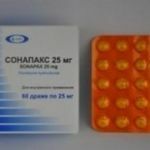 If senile vascular dementia manifests its symptoms, in many cases, Sonapaks will help, the instructions for use and reviews are in our article. In cases of blood circulation disorders in neurology, Vinpocetin is widely used, which we collected about in one article.
If senile vascular dementia manifests its symptoms, in many cases, Sonapaks will help, the instructions for use and reviews are in our article. In cases of blood circulation disorders in neurology, Vinpocetin is widely used, which we collected about in one article. Treatment methods
Dementia to date refers to incurable diseases. In rare cases, it is possible to defeat it. But if you find it in the early stages, then the chances of success will be much greater.
Treatment depends on the cause of the disease. So, in Alzheimer's case, the use of donepezil( aricept) sometimes helps to slow the progression of the disease for a year or more.
Ibuprofen also helps, but only if its use was started during the first stage of dementia.
Dementia, which caused repeated micro-strokes, is incurable. But there is a possibility to slow down its development, or even stop it. To do this, it is necessary to carry out treatment of high blood pressure or diabetes, which provoke seizures.
While the does not invent the drug , which helps with signs of dementia caused by AIDS and Creutzfeldt-Jakob disease.
With a severe degree of dementia characterized by emotional outbursts and an agitated condition, neuroleptics such as haloperidol and sonapax are used. But these drugs often cause side effects.
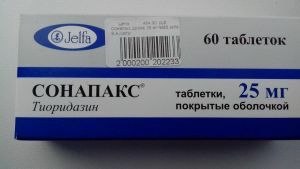 As a result of the use of many types of medicines that are used for colds, insomnia, also from tranquilizers and antidepressants, the patient's condition worsens.
As a result of the use of many types of medicines that are used for colds, insomnia, also from tranquilizers and antidepressants, the patient's condition worsens.
At the same time, the big clock, calendars, communication with familiar people and the support of those who take care of them help with dementia.
Also shown regular activity with small loads, joyful atmosphere, stable and simple mode of the day. Close people should show tact for the patient, but it is not recommended to treat him like a child. In no case can you blame him for his mistakes.
Poorly affects the patient's condition moving to a new location, new furniture, repairs.
Preventative measures
Prevents the emergence of dementia nutrition, which includes antioxidants: vitamin B12, E, folic acid. Their content is quite high in fresh vegetables, nuts and fish.
Increases the risk of for the development of diabetes mellitus and hypertension, so you need to monitor your health. Alcoholism and smoking also provoke the disease and often the first signs of dementia arise precisely for this reason.
Also the prevention of senile dementia includes: getting education, solving puzzles, setting and achieving life goals, as well as walking and jogging - is a pledge of health, both physical and mental.
It was also noted that the presence of the family in humans significantly hampers the development of senile dementia in it. 
From all of the above, it is logical to conclude that it is much easier to prevent the signs of vascular dementia than to cure it, especially given that the treatment does not give much weight to this disease.
At the same time, the methods of disease prevention do not represent anything complicated and are accessible to everyone.
Therefore, take care of your health from a youth, do not get carried away by bad habits and try to constantly develop - this will contribute to the fact that you will meet old age in sound mind and with good health.
Video: Vascular dementia - how to preserve memory and mind
Let's talk about dementia or how to keep the brain healthy until old age. What you need to know about disease prevention?

